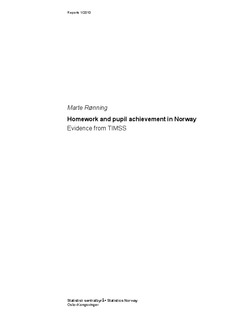| dc.description.abstract | By using data on Norwegian 4th and 8th graders who participated in TIMSS 2007,
this report starts out by investigating whether time spent on homework varies
across pupils from different socio-economic backgrounds. The findings show that
pupils from lower socio-economic backgrounds, in both 4th and 8th grade, are
more likely to spend no time on homework than pupils from higher socio-economic
backgrounds (although homework is given). At the same time it is also found that
if pupils from lower socio-economic backgrounds spend time on homework, they
actually spend more time on it than pupils from higher socio-economic
backgrounds.
One reason why pupils from lower socio-economic backgrounds are more likely to
spend zero time on homework could be lack of interest or necessary skills. Another
explanation may be poor out-of-school learning environments. I.e., these pupils
may have parents who do not or cannot help with homework or make sure that they
complete their homework. There are also many possible explanations why pupils
from lower socio-economic background spend more time on homework than pupils
from higher socio-economic backgrounds. First of all, they may need more time in
to complete their homework if they find the homework more difficult than pupils
from higher socio-economic backgrounds. Also more time spend on homework can
reflect problems related to motivation, frustration and concentration. On the other
hand, more time spent on homework may also reflect high educational ambitions,
regardless of socioeconomic background.
The second aim of the report is to analyze the effect of homework on pupil
achievement. There seem to be a positive effect of homework (in mathematics) on
average. However, not all pupils seem to benefit from homework. In fact, pupils
from lower socio-economic backgrounds (measured as no or very few books at
home) actually perform better if less homework is assigned.
One explanation why homework has a negative effect for some pupils, may be that
homework leads to declining motivation (also during school hours), and hence
indirectly affect the achievement negatively. Another explanation may be poor out
of school learning environments in combination with that homework serves as a
substitute for learning in school. | no_NO |
